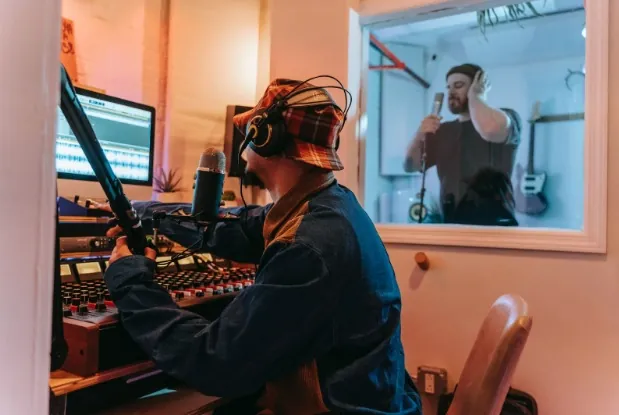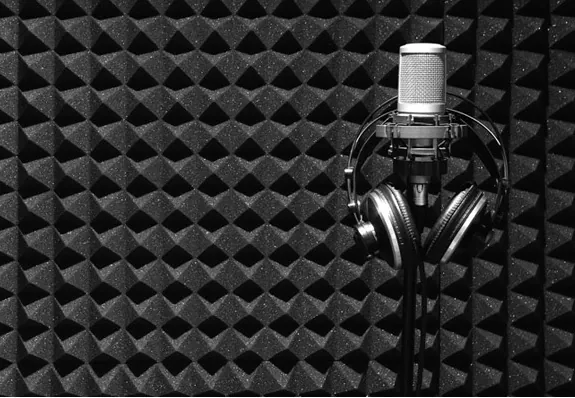
Auditioning for new voice acting roles is a stressful job on its own—especially if you're hunting for your first official gig. At times, casting calls can feel like throwing your name into an empty void, or imposter syndrome may keep you from even pressing submit. But what I'm about to share could help you plug those pesky confidence leaks and put your persevering S.S. Voice Acting ship back on course.
Whether you've got a stellar reel or no reel at all, there's plenty you can do to boost your chances of getting your vocal talents into the ears of those in charge of choosing their latest video game cast.
Follow submission directions
Know this: voice directors often juggle a large number of different roles across multiple projects at once, so we value candidates who make our job easier by following directions down to the smallest detail.
The notion of following directions may seem self explanatory, but you'd be surprised to learn how nearly one-third of our casting submissions never make it past the first hurdle simply because the voice actor didn't follow basic instructions laid out in the request. Don't get this confused. We absolutely love getting to meet new talents and geeking out about all you have to offer, but we also work on tight timelines and need to do whatever we can to swiftly reach the point of putting the perfect candidates in front of creative decision makers.
Pay attention to the specifications listed in any casting call. Are you being asked to use a specific email subject line? Chances are the director has an automated filter set up to keep relevant talent tied to relevant roles. Additionally, if the sheet requests specific file formats, naming conventions, or transfer methods, provide your materials exactly how you are asked.
If you do everything in your power to meet a director's explicit requests, you've accomplished exactly what you need to get your voice into their willing ears, and that's the most important part. Whether you win the role or not, you'll at least have been heard and thereby earned a spot in the running for future roles as a talent who minds the important details of our requests and values our time and goals.
Simply by nailing the details of your submission to a T, you can allow yourself the assurance of having already outperformed ~33 percent of potential candidates.
No reel, no problem
Here's another bit of relief: a polished reel is nice, but it's also rarely a requirement, so stop letting the state of your reel or lack thereof keep holding you back. While these quick audio compilations are a great tool to "break the ice" and demonstrate an actor's range, they're often not the first qualifying factor a busy voice director looks for in a submission. Even a spectacular reel that demonstrates a broad range of skill can just as easily earn a swift rejection if it fails to reflect the profile of what a specific casting call seeks.
It's far more effective to tailor a sample recording for the ask at hand. Get into the mind of the character you're auditioning for, and show how you can breathe life into them from behind the mic. Sometimes casting will even provide specific lines they'd like to hear you read, so hit record and splice together your strongest 2-3 takes. Avoid sending more than what is requested—it's better to show strong judgment in selecting what you feel best represents your interpretation of the role.

Mind your recording space
Speaking of recording takes, it's a great idea to record auditions within the environment and with the equipment you are likely to use should you score the role. Voice directors listen for more than just vocal performance in choosing who is most prepared to get recording sessions off the ground, and only you the artist can control how record-ready your environment sounds.
You don't need the fanciest equipment to capture a good quality reading. You could shell out for a top-shelf mic in a bid for the highest fidelity recordings, but these are also more likely to accentuate unseen and unheard issues with your recording environment. You can easily get away with using any of the wide array of inexpensive XLR mics available as long as you make certain smart preparations in your recording periphery.
Not every voice actor has the luxury of access to a professional recording studio on a whim. Many voice actors at the start of their career lay claim to a quiet closet for home recording sessions (bathroom acoustics highly discouraged). A soft rug, some foam padding, and removal of any resonant materials can help you achieve the kind of dry and pure recording that sound engineers ultimately hope for.
Even items like a metal reading stand or a laptop can give off unwanted background noise that might pick up only on playback (not to mention electronics are a source of residual heat which can quickly lend to a home booth's discomfort). For an easy workaround, we recommend mirroring an internal monitor to an external computer so you don't have to pop in and out of your booth constantly between takes.
As with any DIY recording, you'll also be faced with things outside of your control, such as the sounds of planes, trains, automobiles and the lively outside world. (Take note: nature always wins.) But being aware of these factors can help you gain a sense of when is a good time to record (e.g., not during rush hour or at night when crickets are at their liveliest). Sound engineers may also request isolated room tone recordings for editing levels in your line readings in post-production if needed.
If your recording gig will involve directed recording sessions, you'll also want to make sure your recording space has ample and uninterrupted WiFi access to keep your sessions running smoothly. Using a tablet or monitor instead of printed scripts in your recording practice will also help keep you prepared for instances when lines may be edited in real-time based on your unique performance.
Own your natural strengths first
Stronger auditions are achieved by understanding the characteristics of your own voice and choosing to pursue roles that feel akin to your natural sound. Sure, it's impressive when actors can conjure up wildly new personalities, but we have to ensure sustainability in our work as well. We can't all be vocal polymaths like Alan Tudyk, and no developer expects you to be.
Two to three lines as a sample reading in a fun and unusual voice is one thing, but hours of consistent reading is another. Natural attributes create less strain on our performance and are easier to maintain across lengthy scripts or even multiple game titles. For instance, if your character plays a central role in what could become a game series, you wouldn't want to run the risk of forgetting how to produce a unique voice when they reappear later down the development line. (Games take a while to produce, after all.) Fans will always be the first to note the loss of what made their favorite characters feel unique, and future-minded developers want the reassurance that you can reprise a role with ease when needed.
Take it from this voice director. By starting with what you naturally voice best, taking control of your recording environment, and closely following the directions provided in every casting call, you'll be well on your way to earning more callbacks and securing new voice acting roles in a jiff.
Unlock Audio provides sound, music, voice and audio implementation for games like Iron Man VR by Oculus Studios/Camouflaj Games, Trackmania by Ubisoft Nadeo, and Mobile Legends Bang Bang by Moonton Games.
By aligning game audio with the larger development process, creating exceptional experiences, and using transparent business practices, Unlock Audio is the ideal partner for mid-level game developers.

